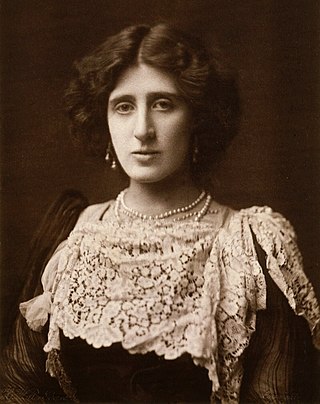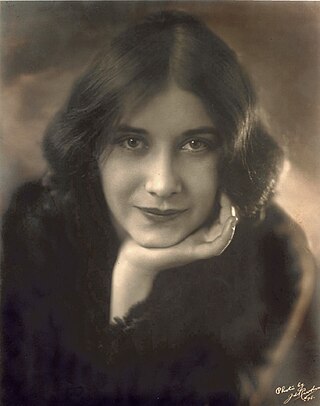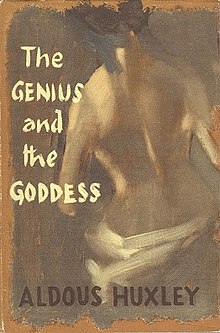
Aldous Leonard Huxley was an English writer and philosopher. His bibliography spans nearly 50 books, including novels and non-fiction works, as well as essays, narratives, and poems.

Brave New World is a dystopian novel by English author Aldous Huxley, written in 1931 and published in 1932. Largely set in a futuristic World State, whose citizens are environmentally engineered into an intelligence-based social hierarchy, the novel anticipates huge scientific advancements in reproductive technology, sleep-learning, psychological manipulation and classical conditioning that are combined to make a dystopian society which is challenged by the story's protagonist. Huxley followed this book with a reassessment in essay form, Brave New World Revisited (1958), and with his final novel, Island (1962), the utopian counterpart. This novel is often compared to George Orwell's 1984 (1949).
Madame Curie is a 1943 American biographical film made by Metro-Goldwyn-Mayer. The film was directed by Mervyn LeRoy and produced by Sidney Franklin from a screenplay by Paul Osborn, Paul H. Rameau, and Aldous Huxley (uncredited), adapted from the biography by Ève Curie. It stars Greer Garson, Walter Pidgeon, with supporting performances by Robert Walker, Henry Travers, and Albert Bassermann.

In Greek mythology, Ariadne was a Cretan princess and the daughter of King Minos of Crete. There are different variations of Ariadne's myth, but she is known for helping Theseus escape the Minotaur and being abandoned by him on the island of Naxos. There, Dionysus saw Ariadne sleeping, fell in love with her, and later married her. Many versions of the myth recount Dionysus throwing Ariadne's jeweled crown into the sky to create a constellation, the Corona Borealis.

Lady Ottoline Violet Anne Morrell was an English aristocrat and society hostess. Her patronage was influential in artistic and intellectual circles, where she befriended writers including Aldous Huxley, Siegfried Sassoon, T. S. Eliot and D. H. Lawrence, and artists including Mark Gertler, Dora Carrington and Gilbert Spencer.

Leonard Huxley was an English schoolteacher, writer and editor.

Bernice Rubens was a Welsh novelist. She became the first woman to win the Booker Prize in 1970, for The Elected Member.

Island is a 1962 utopian manifesto and novel by English writer Aldous Huxley, the author's final work before his death in 1963. Although it has a plot, the plot largely serves to further conceptual explorations rather than setting up and resolving conventional narrative tension.

"Ulalume" is a poem written by Edgar Allan Poe in 1847. Much like a few of Poe's other poems, "Ulalume" focuses on the narrator's loss of his beloved due to her death. Poe originally wrote the poem as an elocution piece and, as such, the poem is known for its focus on sound. Additionally, it makes many allusions, especially to mythology, and the identity of Ulalume herself, if a real person, has been a subject of debate.

Eyeless in Gaza is a novel by Aldous Huxley, first published in 1936. It is an account of the life of a socialite named Anthony Beavis between the 1890s and 1936.
The Huxley family is a British family; several of its members have excelled in science, medicine, arts and literature. The family also includes members who occupied senior positions in the public service of the United Kingdom.

Mary: A Fiction is the only complete novel by 18th-century British feminist Mary Wollstonecraft. It tells the tragic story of a woman's successive "romantic friendships" with a woman and a man. Composed while Wollstonecraft was a governess in Ireland, the novel was published in 1788 shortly after her summary dismissal and her decision to embark on a writing career, a precarious and disreputable profession for women in 18th-century Britain.
Laura Huxley was an American musician, author, psychotherapist and lecturer. She was married to author Aldous Huxley from 1956 until his death in 1963.

Ruth Hall: A Domestic Tale of the Present Time is a roman à clef by Fanny Fern, a popular 19th-century newspaper writer. Following on her meteoric rise to fame as a columnist, she signed a contract in February 1854 to write a full-length novel. She finished Ruth Hall within a few months, and it was first published in November 1854.

Lucille Kahn (1902–1995) was a successful Broadway stage actress who became notable in the 1950s and 1960s for her advocacy and support for efforts to expand human consciousness.

"Oenone" or "Œnone" is a poem written by Alfred Tennyson in 1829. The poem describes the Greek mythological character Oenone and her witnessing incidents in the life of her lover, Paris, as he is involved in the events of the Trojan War. "Oenone" was inspired by Tennyson's trip to Spain, where he visited the Pyrenees mountains. It is considered the simplest of Tennyson's dramatic monologues.
Robert "Bob" Briggs is a fictional screenwriter living in 1940s Hollywood. His one appearance to date is in Aldous Huxley's dystopian satire Ape and Essence.

Time Must Have a Stop is a novel by Aldous Huxley, first published in 1944 by Chatto & Windus. It follows the story of Sebastian Barnack, a young poet who holidays with his hedonistic uncle in Florence. Many of the philosophical themes discussed in the novel are explored further in Huxley's 1945 work The Perennial Philosophy.
Huxley on Huxley is a 2009 documentary directed by Mary Ann Braubach, narrated by Peter Coyote and includes interviews with Laura Huxley, drummer John Densmore, spiritual leader Ram Dass, Esalen co-founder Michael Murphy, artist Don Bachardy, philosopher Huston Smith and actor Nick Nolte, star of the adaptation of Aldous Huxley's 1955 novel The Genius and the Goddess. The film features archival footage of Aldous Huxley, Timothy Leary, Mike Wallace, and Igor Stravinsky, and photographs from Laura and Aldous Huxley’s personal collection, as well as other historical archives.

The following bibliography of Aldous Huxley provides a chronological list of the published works of English writer Aldous Huxley (1894–1963). It includes his fiction and non-fiction, both published during his lifetime and posthumously.














